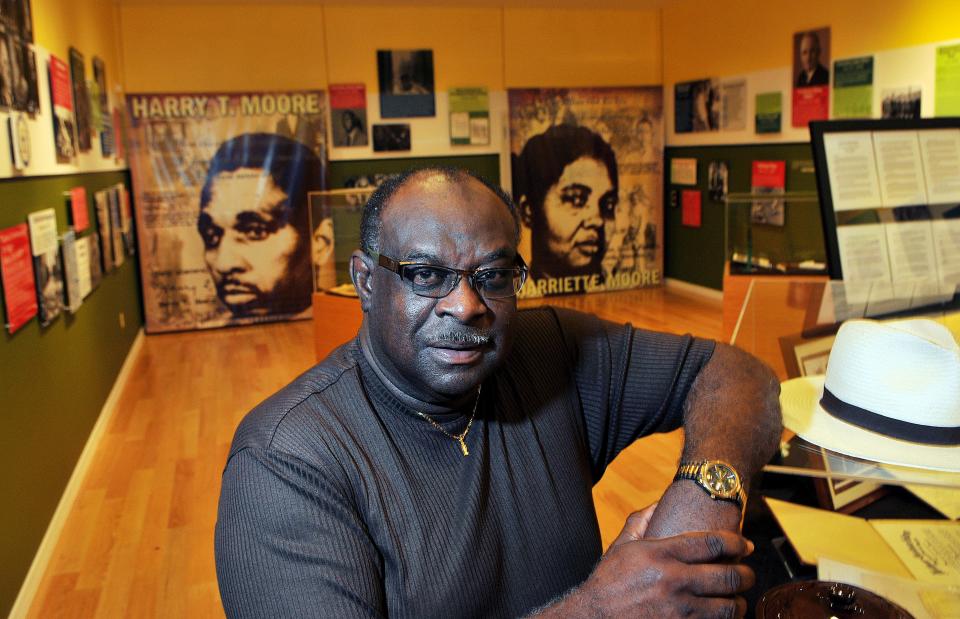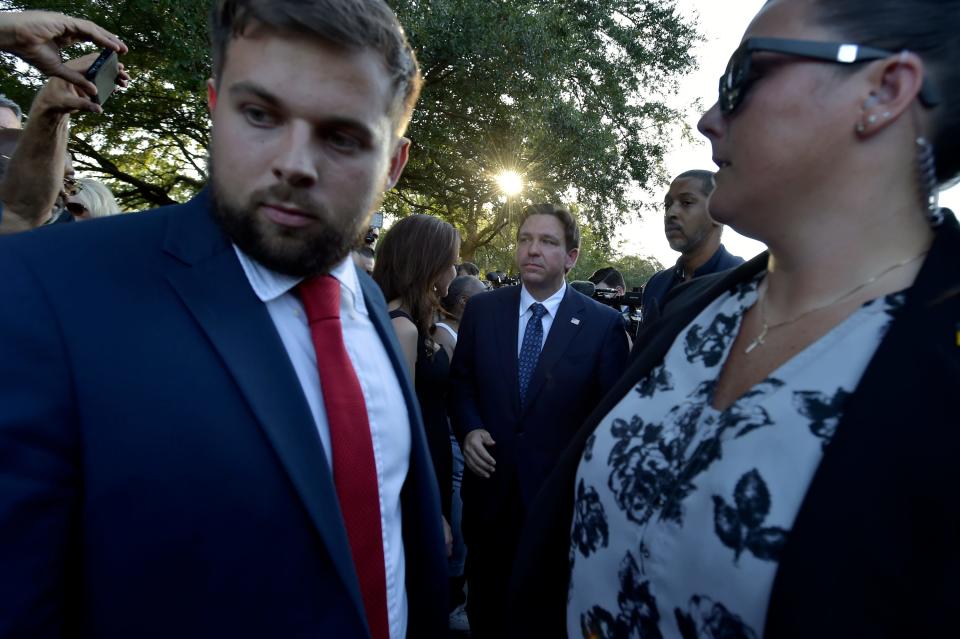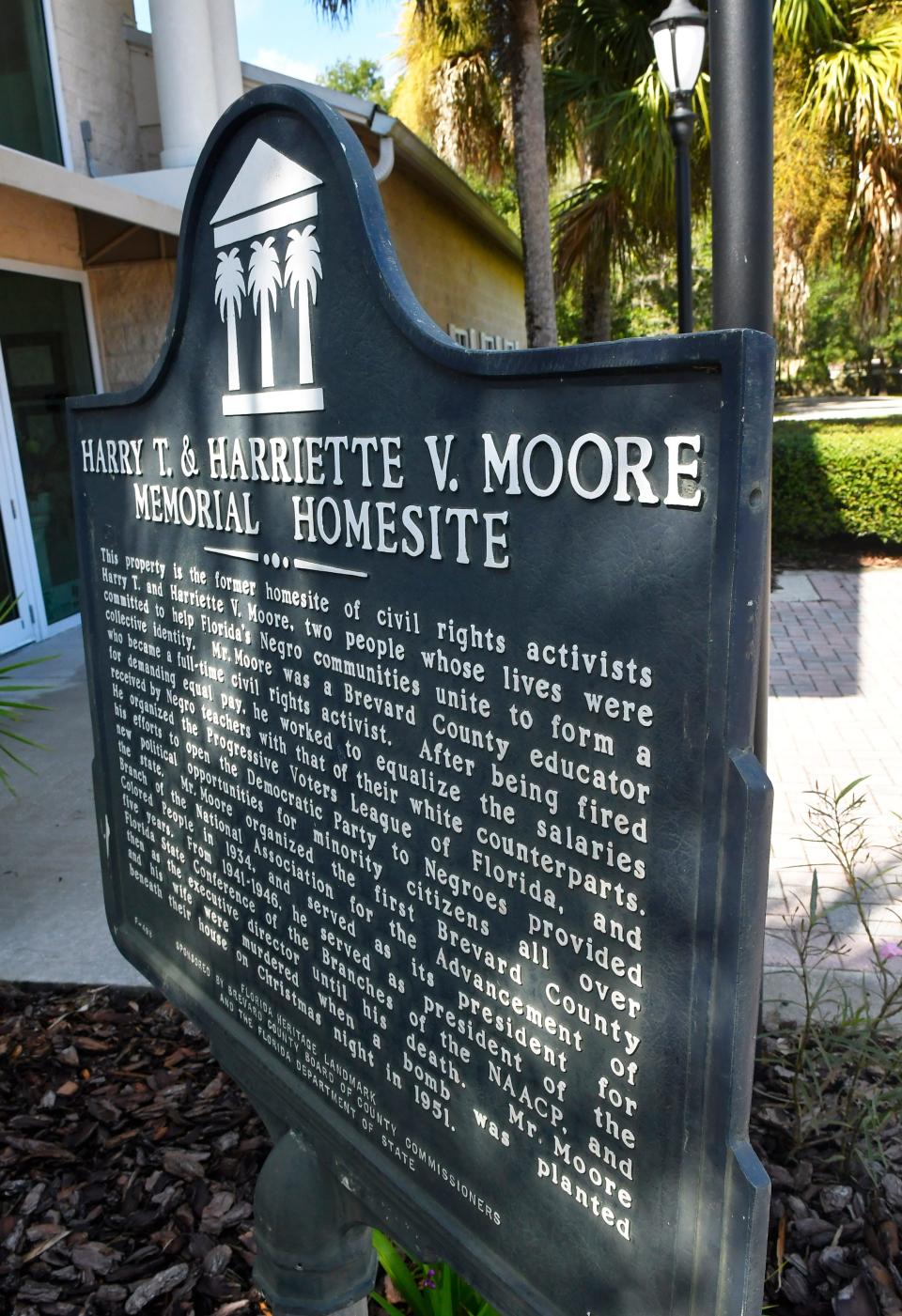Historic NAACP branch tied to Moores is revived in northern Brevard
- Oops!Something went wrong.Please try again later.
After a short period of inactivity and nearly 90 years after Harry and Harriette Moore founded the branch amid the orange groves of Mims, the North Brevard chapter of the NAACP has reorganized with a fresh focus on civil rights.
The move to reset the Titusville chapter comes as Florida — like it was during the 1920s — once again has become a focal point for racial tension with book bans, Gov. Ron DeSantis’ efforts to reshape Black studies for students on topics like slavery and what law enforcement said was the racially-motivated killing of three African-Americans at a Jacksonville retail store last weekend.
“We have to continue the fight, progress has been made but there is a lot of work that remains,” said Bill Gary, who was voted by members to serve again as president of the storied branch of the venerable civil rights organization.

Efforts to reset the organization got underway after the past president, Jeff Davis, resigned last November following a period of internal strife. Davis did not return calls requesting comment.
Gary, a past president, and others worked behind the scenes with the national and state offices of the NAACP for six months to revive the defunct chapter. Members held an election in May while working to make the historic branch solvent again. The first official executive committee branch meeting was held Aug. 7 at the Gibson Community Center library, drawing nearly 40 people from the community.
“Our officers were really excited and everything went really well,” Gary said. "The reason for reorganization is that there were a group of people in northern Brevard who deeply felt that we have to be active and present while we are dealing with these issues. And also, partly because this was the base of operation for the Moores. We feel a kindred connection to the work he was doing."
The Moores, who were graduates of Bethune Cookman College in Daytona, worked as educators when they started the Brevard chapter of the NAACP in 1934, nearly 15 years after the Rosewood Massacre, where a Black town in west Florida was razed and its population scattered by white mobs. Florida had also seen a deadly mass riot that killed dozens of Blacks in Ocoee, a town near Orlando. Lynchings of Blacks continued throughout the state with the Ku Klux Klan and sympathizers infiltrating political offices and law enforcement agencies, according to historians.

The Moores had become increasingly vocal in the fight for equality and equity, traveling the state during the height of segregation to encourage Blacks to vote, despite lingering fears of retribution. Harry Moore registered thousands of Blacks to vote. He also worked closely with national civil rights figures like attorney Thurgood Marshall on cases involving police brutality.

In 1951, someone plated a bomb beneath the Moores' bed. The bomb exploded on the evening of Christmas Day, making the Moores' the first martyrs of the modern civil rights movement, just fours years before Martin Luther King Jr. arrived on the national scene with a bus boycott in Montgomery, Alabama . No one was arrested in the deaths of the Moores and the story — not mentioned in school books — faded from the front pages until the 2000s.
Today, the Moores' wood-framed home has been restored and sits on the grounds of the Harry T. & Harriette V. Moore Cultural Complex in Mims.

Alberta Wilson, a longtime community activist and past president of the Central Brevard branch of the NAACP, was ecstatic that the civil rights group was able to keep the branch moving forward. "I was 14 years old when I became a youth president of the NAACP in South Carolina. I was so saddened when this branch became defunct. Harry and Harriette Moore started that branch for all of Brevard. But now that they have reorganized, I am just elated," Wilson said.
"It's much needed, especially now."
More: 'Gathered here to celebrate greatness': Moores honored at annual graveside service
Today, there are three branches of the NAACP on the Space Coast, with the others located in Cocoa and Melbourne. Over the years, each of the branches have become involved in independent investigations, protests and calls for litigation.
Gary said that recent struggles over civil rights along with the increase in racialized, political rhetoric, makes the mission of the NAACP as necessary now as it was in the past. "As we look at the political landscape, its supporters are needed now more than ever," he said.
The shooting at a Jacksonville Dollar General store, leaving three Blacks dead, points to a need for increased attention by law enforcement and dialogue, he said. The 21-year-old suspect — who carried two guns, including a swastika-painted AR-15-style rifle and made clear in a manifesto the attack was racially motivated — died by suicide, Jacksonville law enforcement agents reported. Already, the NAACP's national conference has issued a travel advisory for Florida, citing what it called hostility toward Blacks and members of the LGBTQ community.
Since restarting, branch members have met with Brevard Public School officials to discuss recruitment of more Black teachers and teachers of color, with more information expected to be delivered to the group during an upcoming general meeting. The branch crafted a renewed focus on economics and is partnering with Greater St. James M.B.C. to hold a Black Wall Street forum with business leaders and others from 11 a.m. to 3 p.m. on Sept. 16 at the Cuyler Community Center in Mims .
There have been meetings that have included Titusville police to discuss addressing ongoing violence plaguing portions of north Brevard. A general membership meeting will take place 7 p.m. Sept. 11 at the Gibson Community Center Library, 835 Sycamore Street.
The group will also hold its annual Freedom Fund Banquet on Oct. 28, with State Sen. Rosalind Osgood as the keynote speaker.
The rekindled efforts, said Gary, are a part of the Moores legacy, which still looms large. The couple, whose name adorns the courthouse complex in Viera, were nominated last year for a Presidential Medal of Freedom in honor of their work to register Blacks to vote while working for equity and equality for teachers.
"We're going to to talk about the future," Gary said. "There is still a challenge."
J.D. Gallop is a criminal justice/breaking news reporter at FLORIDA TODAY. Contact Gallop at 321-917-4641 or jdgallop@floridatoday.com.
This article originally appeared on Florida Today: Members revive historic North Brevard NAACP branch tied to the Moores

